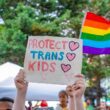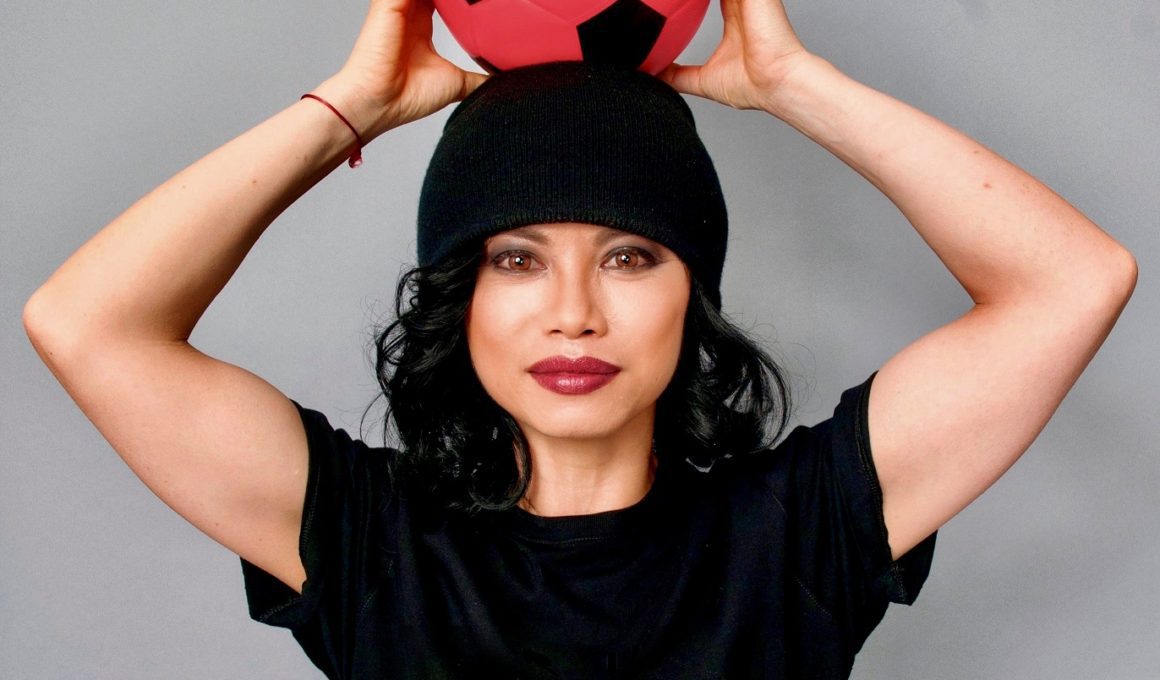Welcome to the seventh installment of The Yappie’s series featuring Asian American and Pacific Islander (AAPI) newsmakers, rising candidates, and lawmakers. If you’re interested in being featured, please email [email protected].
“This is what failure looks like.”
It’s what Amazin LeThi’s teacher said after making LeThi—the only Asian in the room—stand up in front of her 30-person class.
That incident stayed with her for decades, LeThi told The Yappie’s Samson Zhang and Mary Yang. But it wasn’t the only abuse she faced in her youth.
LeThi was only a baby when her mother left her in an orphanage in Saigon in the aftermath of the Vietnam War. A white Australian family later adopted LeThi and brought her to their home in Sydney.
Growing up as a transracial adoptee in a predominantly white community, LeThi was forced to confront racism and discrimination every day. She dealt with a barrage of slurs and bullying as a child in an isolating period that left a lasting impact.
A dumbbell lying around LeThi’s house provided an early—and ultimately enduring—source of solace. At just six years old, LeThi began weight training. She wanted to become stronger so she could stand up to bullies, she remembers, but also to build the confidence and self-love that had been so tarnished by her environment. As a result, she spent most of her youth in the gym, and read health and fitness magazines in her free time.
There, she found an unlikely role model: Arnold Schwarzenegger.
At first glance, Schwarzenegger doesn’t seem to have much in common with LeThi. But, like LeThi, Schwarzenegger was an outsider when he immigrated to America from Austria. The bona fide movie star was a bodybuilder, but faced similar rejection early in his acting career due to his physical appearance, accent, and name.
But Schwarzenegger refused to change for Hollywood. LeThi saw in him a script for how she could fight for the freedom to uncompromisingly celebrate her identity. “He remained true to his own story and his own authenticity, that I’m going to continually show up as myself, I’m not going to check myself for you,” LeThi said.
The discrimination in her childhood had brought her as low as depression and homelessness, but bodybuilding gave her the resilience she needed to reclaim her life as a queer Asian American woman.
A “lifetime of sport” made her stronger both physically and mentally, she said. That’s a feeling she embraces in her work as an equity and inclusion advocate, which has taken her across the world to cities like Saigon, London, Atlanta, and Washington D.C.
Now, facing a resurgence of anti-Asian hate that’s all too familiar, LeThi is raising her voice to be the role model she never had.






Photos courtesy of Alina Oswald and Amazin LeThi
“Ticking time bomb”
Schwarzenegger and bodybuilding gave LeThi a way to see herself positively for the first time in her life, but it didn’t end her struggles with discrimination.
Bodybuilding is dominated by masculinity, and particularly by cis white men, LeThi says. In the gym, she faced all kinds of misogyny and sexism along with racism. As a kid, she had no idea how to respond to the “totally unchecked, uncensored conversations that men were having amongst themselves.”
On a sprinting team at one point, LeThi was pushed out by a coach who told her that she “wasn’t designed for sprinting” and that long-distance running would be “much better” for an Asian kid.
Ultimately, she found herself alone. She had no friends with people ostracizing her at school, while her parents failed to understand her struggles. LeThi’s parents would say they didn’t see color, a line of thinking that is common among transracial adoptive families. “If you don’t see my identity, then you’re erasing who I am,” she said. “They think love is enough.”
Even after growing older and becoming a competitive bodybuilder, LeThi continued to feel singled out as an Asian woman.
At 16, LeThi decided to leave Australia and began traveling around Europe and the U.S. in search of community. She wasn’t close with her parents and didn’t have other family, so she found work at bars and clubs to make money.
But the pain and trauma LeThi suppressed was a “ticking time bomb,” she said, and the bomb eventually exploded. LeThi’s self-described desperation to “set herself free” led to parties, bad crowds, and a rapid spiral into poverty and homelessness. While drifting in and out of homeless shelters, LeThi struggled with severe mental health issues, including suicidal ideation.
At her lowest point, LeThi remembers sleeping for two days straight in a shelter, getting up at 6 p.m. on the third day, and breaking down. “I started crying uncontrollably, thinking about what’s happened to my life,” said LeThi, who remembered thinking “I’ve hit rock bottom.”
In that moment, a memory assailed her: standing in the middle of that classroom as her teacher declared her a failure. “I will be the kid that will fail” was the message LeThi had internalized from her teacher and bullies. At rock bottom, she reevaluated the message: “This would be the greatest failure, if I don’t find a way to pull myself out of this situation.”
Slowly but steadily, LeThi found herself drawing on resilience built from years of hardship and sport alike to survive and bounce back. Bodybuilding had been a misogynistic space that didn’t want her in it, she said, but she’d been able to cope because she loved the sport. “It was my survival mechanism," she said. She knew she’d have to rely on her own grit this time, too.
Recovering took years. “It was the hardest thing that I ever did and I had a nervous breakdown, but I was able to pull myself out," LeThi told us.
These days, she pulls strength from the friends she encountered along the way.
She keeps up daily with a friend from home, whom she met as a teenager when she found her normal hairdresser unavailable one day. She was his first haircut—she admitted she was more than a smidge nervous—and he became her first gay friend. The lanky white stylist is the one person in LeThi’s life who has always held her up.
Connecting with people who endured similar trials also makes a difference. LeThi remembers chatting with Argentina-born Korean Australian actor Leonardo Nam and bonding over childhood experiences. Nam and LeThi’s stories were “siloed” in Australia, but now LeThi has a chance to make sure other Asian kids know they’re not alone, she said.
Finding her way to advocacy
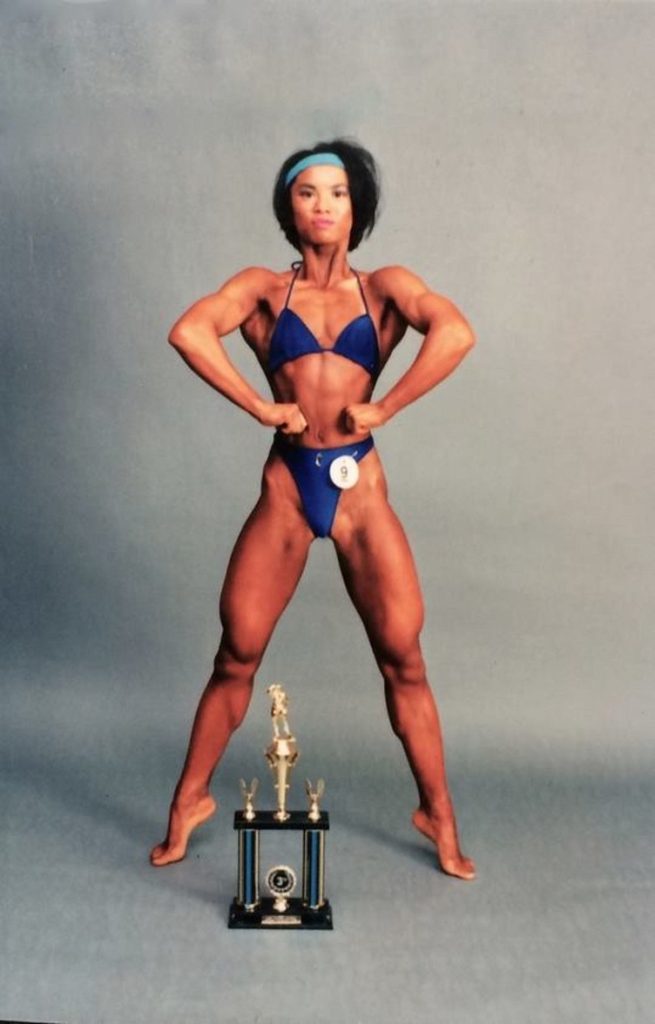

In the last two years’ rise in anti-Asian hate, LeThi saw a recurrence of her own childhood experiences, and the same lack of understanding for the challenges Asian and LGBTQ kids face.
When LeThi realized that she could use her own story to harness for her communities, she felt compelled to begin advocacy work. “I have this opportunity to be able to change hearts and minds and to shift the conversation,” LeThi remembered thinking. “Realizing that one person’s voice can make a difference led me to all the advocacy work I do now.”
Though Asian Americans are the fastest-growing ethnic group in the U.S., they remain vastly underrepresented in sports. And while the LGBTQ community has seen itself increasingly reflected in sports—at least 186 LGBTQ athletes competed at the Tokyo Olympics, three times as many as the count in 2016, according to Outsports— athletes still remain closeted for years due to fear of backlash.
LeThi’s job is to work with groups, ranging from sports organizations and national governments to Fortune 500 companies, to determine what needs to be done “from grassroots to pro levels to cultivate safe and nurturing spaces, so we can see more diversity and inclusion of Asians in sports.”
During the Obama administration, she helped organize the first Spirit Day collaboration with GLAAD and the White House Initiative on Asian Americans and Pacific Islanders (WHIAAPI). Her story was featured in WHIAAPI’s anti-bullying campaign Act to Change.
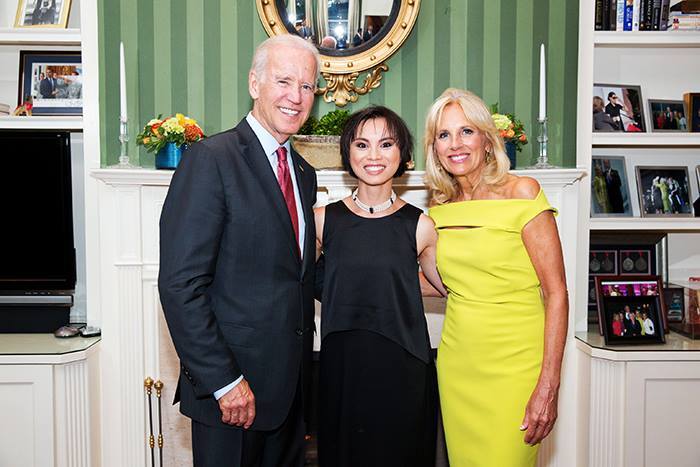

Ahead of the 2020 election, she joined the Biden campaign’s LGBTQ+ for Biden and Asian Pacific Islander committee. She also partnered with LGBTQ news outlet The Advocate to host its first Pride Month Asian LGBTQ voices series.
LeThi currently holds sports ambassadorships with the UK and Australian governments, Stonewall UK, the Federation of Gay Games, Pride House Birmingham, and the Anti-Defamation League.
“It’s great to have Amazin onboard as one of our Sports Champions,” Stonewall UK’s Robbie de Santos has said. “We’re grateful that she’s lending her voice and story to help more people learn about LGBT equality in sport. Together, we will make sport everyone’s game.”
But, like everyone else, LeThi says there are days she wants to give up. Convincing people in positions of power to champion Asian and LGBTQ representation is exhausting, especially when she’s constantly repeating herself. “How many times do I need to come back and say the same thing to you?” she pointed out.
Unlike office work, the results of advocacy work are difficult to measure. Her greatest gratification comes from moments “when I meet members of the LGBTQ and Asian community where they’ve said to me, ‘I’ve heard about you, I’ve heard about your work, and it’s impacted my life because I’m queer or I’m in sports. It’s made a difference to know that there’s someone championing me—because when I heard your story it was the first time I saw myself.’”
Bold and outspoken
As LeThi worked to make herself a place among the Schwarzeneggers, she witnessed firsthand the importance of Asian queer representation.
LGBTQ author, stand-up comedian, and actress Magaret Cho serves as a particular inspiration for LeThi. It was an "aha" moment when LeThi discovered Cho. “I saw an unapologetic, proud Asian queer woman,” she said. “I saw my story.”
Cho’s outspokenness and advocacy work “paved the way” for LeThi to become who she is today, LeThi told us.
When Texas’ near total-abortion ban went into effect this year, LeThi took to Twitter to voice her protest. The controversial measure is the most restrictive abortion law in the U.S., barring abortions after six weeks and incentivizing citizens to sue people who violate the law.
“A Woman has the fundamental right to make the choice over her body for herself,” LeThi tweeted. Advocates have said the law will disproportionately impact communities of color, especially Black people."
LeThi is also intentional about raising awareness of mental health and mental illness.
The stigma around mental health is still prevalent in a lot of Asian communities, but that’s changing with more athletes—like tennis star Naomi Osaka—speaking up in public, LeThi says.
That matters.
After all, just one voice can make a difference.
An unapologetic self
For people who work in advocacy, staying grounded is key. “You’re constantly giving so much of yourself,” LeThi said. “And you need time to refill.”
Before the pandemic, LeThi spent most of her time traveling to different events as a motivational and keynote speaker. She's in high demand—likely because “no one gets to meet an Asian LGBTQ athlete,” she guessed.
It can wear on her at times, but LeThi finds space to breathe in the little things: meditating, turning off technology, and listening to classical music. It’s a practice she picked up as an elite athlete, she said—athletes need to know how to calm themselves down before a competition.
Her current project is a campaign aimed at celebrating LGBTQ representation in sports in the lead-up to Stonewall UK’s Rainbow Laces Day this December. Next year, LeThi told us, she plans to launch a sports and leadership academy for unhoused youth in Georgia. She piloted the program years ago during a stint in Vietnam, where she started her advocacy career.
“I really did accomplish my dream as a child” to make a difference through sports, she mused as we spoke. “I don’t think many people are able to say that.”
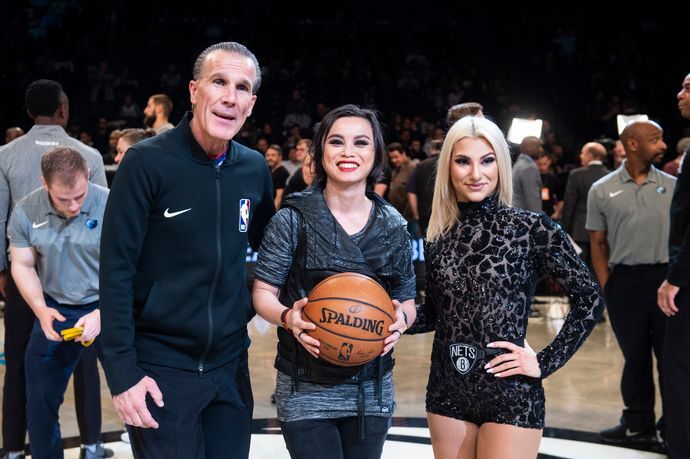

In many ways, LeThi has surpassed her childhood role model. Schwarzenegger's filmography primarily served a Western audience, while LeThi’s work takes her around the world to underserved countries. Schwarzenegger’s role as California governor touched one state, while LeThi has boosted the visibility of Asian and LGBTQ communities across the globe. Schwarzenegger’s legacy is also now marred by the scandal of his affair, while LeThi’s journey of self-discovery has given her a platform to advocate for people who need her voice.
After so many years, LeThi has learned through activism to celebrate her identity as a source of power. “I used to hide bits of myself for so many years. It was like carrying 100 kilos on my back and it just weighed me down,” she said with a smile.
“I’m not a label, I shouldn’t fit myself into a box, and those that can’t accept me for who I am are [people] I don’t want to be around anyway,” she added. “I’m so much more successful being my authentic self, being an unapologetic Asian proud queer woman who just shows up as myself.”





